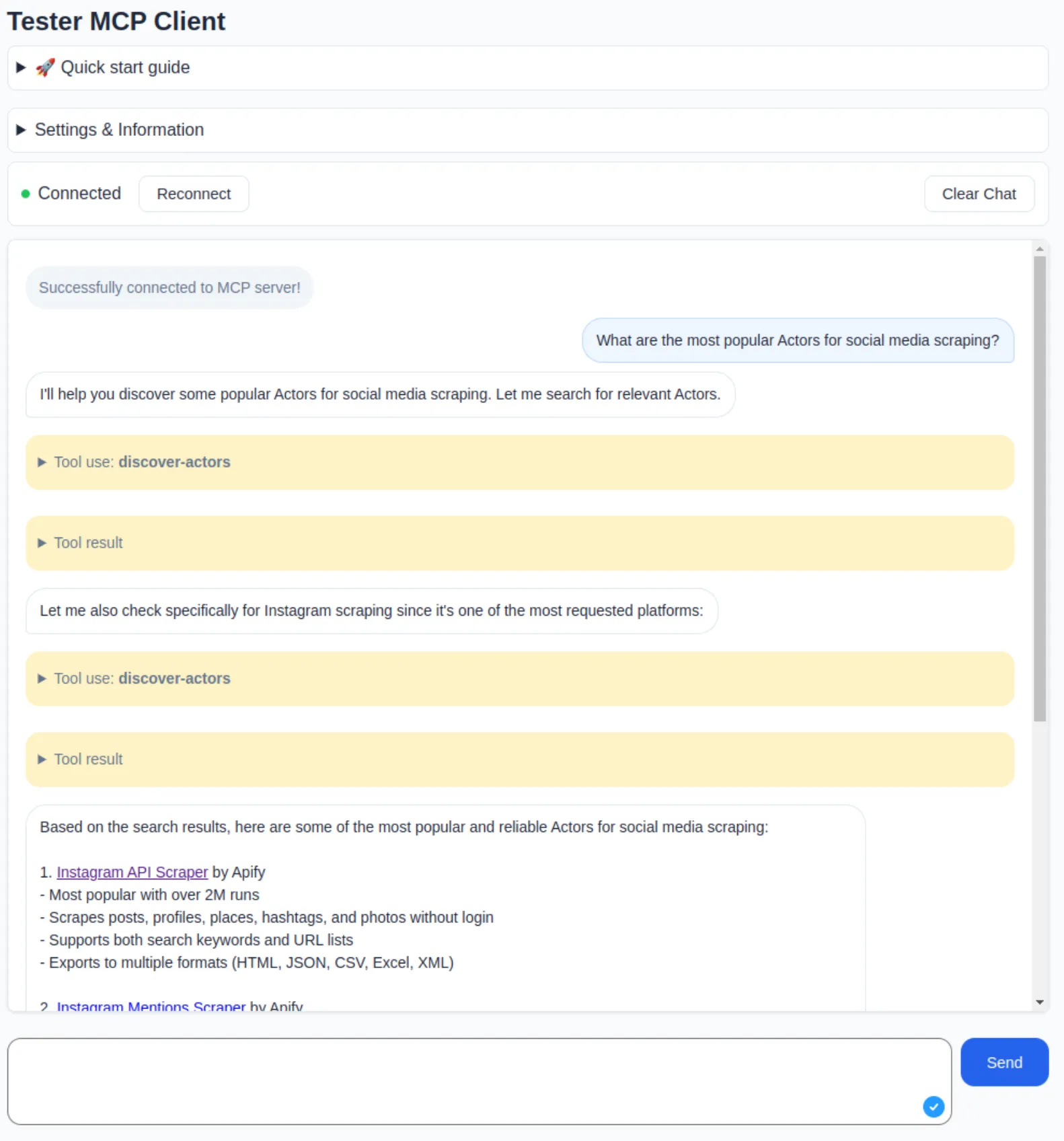Tester MCP Client
by
Connects to any MCP server using HTTP streamable or Server‑Sent Events and presents the interaction in a chat‑like UI, enabling quick testing and debugging of MCP endpoints.
Tester MCP Client Overview
What is Tester MCP Client about?
The tool provides a lightweight, standalone Actor that acts as a bridge between a browser UI and an MCP server. It establishes a streamable HTTP or SSE connection, forwards user queries, receives real‑time responses (including tool calls), and renders the whole conversation in a chat interface.
How to use Tester MCP Client?
- Run on Apify – Click Try for free or start the Actor from the Apify console. Supply the MCP server URL, optional system prompt, and API key in the Actor input.
- Local development – Clone the repository, run
npm install, setAPIFY_TOKENand optionalLLM_PROVIDER_API_KEYin a.envfile, then start withnpm start. Openhttp://localhost:3000in a browser. - After the run starts, check the logs for a link such as
https://…runs.apify.netand open it. The UI will let you type queries and see streamed responses.
Key features of Tester MCP Client
- Connects via HTTP streamable (recommended) or SSE.
- Interactive chat UI showing LLM output and tool‑call blocks.
- Supports Authorization headers and API keys for secure server connections.
- Dynamically resolves and displays tool usage based on context.
- Open‑source code available on GitHub for modification.
- Pay‑per‑event pricing model; no LLM API key required unless you want to use your own provider.
Use cases of Tester MCP Client
- Testing MCP servers – Verify response streaming, tool calls, and error handling.
- Developing new MCP services – Quickly prototype and debug server logic.
- Evaluating Apify Actors as tools – Interact with the Apify MCP Server to discover and run thousands of actors via chat.
- Educational demos – Show how model‑context interactions work in a visual, hands‑on way.
FAQ from the Tester MCP Client
Do I need an LLM provider API key? No. The client can run using Apify’s built‑in LLM integration. Provide your own key only if you prefer a specific provider.
Is the project open source? Yes, the source code is hosted on GitHub (https://github.com/apify/tester-mcp-client).
What is the pricing model? Pay‑per‑event: you are charged for actor start, runtime, and each answered query (free when using your own LLM key). The free tier allows ~80 hours of run time per month.
Can I run the client locally?
Absolutely. Clone the repo, install dependencies with npm, configure .env, and start with npm start.
Which transport methods are supported? Both HTTP streamable (preferred) and Server‑Sent Events (SSE) are supported.
What limitations exist? The client does not implement all MCP features such as Prompts and Resource handling.
Tester MCP Client's README

Tester MCP Client
Pricing
Pay per event

Tester MCP Client
Developed by
Maintained by Apify
A model context protocol (MCP) client that connects to any MCP server using Server-Sent Events (SSE) and displays the conversation in a chat-like UI. It is a standalone Actor server designed for testing MCP servers over SSE.
5.0 (5)
Pricing
Pay per event
20
704
107
Last modified
6 days ago
READMEInputPricingAPISource codeIssues
Tester Client for Model Context Protocol (MCP)#tester-client-for-model-context-protocol-mcp
https://apify.com/jiri.spilka/tester-mcp-client
Implementation of a model context protocol (MCP) client that connects to an MCP server using HTTP streamable (recommended) or Server-Sent Events (SSE) transport and displays the conversation in a chat-like UI. It is a standalone Actor server designed for testing MCP servers over HTTP streamable or SSE. It uses Pay-per-event pricing model.
For more information, see the Model Context Protocol website or blogpost What is MCP and why does it matter?.
Once you run the Actor, check the output or logs for a link to the chat UI interface to interact with the MCP server. The URL will look like this and will vary each run:
Navigate to https://...apify.net to interact with chat-ui interface.
🚀 Main features#main-features
- 🔌 Connects to an MCP server using HTTP streamable (recommended) or Server-Sent Events (SSE)
- 💬 Provides a chat-like UI for displaying tool calls and results
- 🇦 Connects to an Apify MCP Server for interacting with one or more Apify Actors
- 💥 Dynamically uses tools based on context and user queries (if supported by a server)
- 🔓 Use Authorization headers and API keys for secure connections
- 🪟 Open source, so you can review it, suggest improvements, or modify it
🎯 What does Tester MCP Client do?#what-does-tester-mcp-client-do
When connected to Apify MCP Server the Tester MCP Client provides an interactive chat interface where you can:
- "What are the most popular Actors for social media scraping?"
- "Show me the best way to use the Instagram Scraper"
- "Which Actor should I use to extract data from LinkedIn?"
- "Can you help me understand how to scrape Google search results?"

📖 How does it work?#how-does-it-work
The Apify MCP Client connects to a running MCP server over HTTP streamable (recommended) or SSE and it does the following:
- Initiates a streamable HTTP connection to the MCP server or SSE connection (
/sse). - Sends user queries to the MCP server via
POST /message. - Receives real-time streamed responses (via
GET /sse) that may include LLM output, and tool usage blocks - Based on the LLM response, orchestrates tool calls and displays the conversation
- Displays the conversation
⚙️ Usage#usage
- Test any MCP server over SSE
- Test Apify MCP Server and the ability to dynamically select amongst thousands of tools
Learn about the key features and capabilities in the Apify MCP Server Tutorial: Integrate 5,000+ Apify Actors and Agents Into Claude video
Normal Mode (on Apify)#normal-mode-on-apify
You can run the Tester MCP Client on Apify and connect it to any MCP server that supports SSE. Configuration can be done via the Apify UI or API by specifying parameters such as the MCP server URL, system prompt, and API key.
Once you run Actor, check the logs for a link to the Tester MCP Client UI, where you can interact with the MCP server: The URL will look like this and will be different from run to run:
INFO Navigate to https://......runs.apify.net in your browser to interact with an MCP server.
💰 Pricing#pricing
The Apify MCP client uses a modern and flexible approach for AI Agents monetization and pricing called Pay-per-event. You only need to have Apify account and you can use it, LLM provider API key is not required but you can supply it if you want to use your own LLM provider.
Events charged:
- Actor start (based on memory used, charged per 128 MB unit)
- Running time (charged every 5 minutes, per 128 MB unit)
- Query answered (depends on the model used, not charged if you provide your own API key for LLM provider)
When you use your own LLM provider API key, running the MCP Client for 1 hour with 128 MB memory costs approximately $0.06. With the Apify Free tier (no credit card required 💳), you can run the MCP Client for 80 hours per month. Definitely enough to test your MCP server!
📖 How it works#how-it-works
Browser ← (SSE) → Tester MCP Client ← (HTTP streamable or SSE) → MCP Server
We create this chain to keep any custom bridging logic inside the Tester MCP Client, while leaving the main MCP Server unchanged. The browser uses SSE to communicate with the Tester MCP Client, and the Tester MCP Client relies on HTTP streamable or SSE to talk to the MCP Server. This separates extra client-side logic from the core server, making it easier to maintain and debug.
- Navigate to
https://tester-mcp-client.apify.actor?token=YOUR-API-TOKEN(or http://localhost:3000 if you are running it locally). - Files
index.htmlandclient.jsare served from thepublic/directory. - Browser opens SSE stream via
GET /sse. - The user's query is sent with
POST /message. - Query processing:
- Calls Large Language Model.
- Optionally calls tools if required using
- For each result chunk,
sseEmit(role, content)
Local development#local-development
The Tester MCP Client Actor is open source and available on GitHub, allowing you to modify and develop it as needed.
Download the source code:
git clone https://github.com/apify/tester-mcp-client.gitcd tester-mcp-client
Install the dependencies:
npm install
Create a .env file with the following content (refer to the .env.example file for guidance):
APIFY_TOKEN=YOUR_APIFY_TOKENLLM_PROVIDER_API_KEY=YOUR_API_KEY
Default values for settings such as mcpUrl , systemPrompt , and others are defined in the const.ts file. You can adjust these as needed for your development.
Run the client locally
$npm start
Navigate to http://localhost:3000 in your browser to interact with the MCP server.
Happy chatting with Apify Actors!
ⓘ Limitations and feedback#limitations-and-feedback
The client does not support all MCP features, such as Prompts and Resource.
References#references
- Model Context Protocol
- Apify MCP Server
- Apify MCP Server
- Pay-per-event pricing model
- What are AI Agents?
- What is MCP and why does it matter?
- How to use MCP with Apify Actors
- Apify MCP Server Tutorial: Integrate 5,000+ Apify Actors and Agents Into Claude
On this page
Share Actor:
Related articles
Build and deploy MCP servers in minutes with a TypeScript templateRead moreBest MCP servers for developersRead moreHow to use MCP with Apify ActorsRead more
Tester MCP Client Reviews
Login Required
Please log in to share your review and rating for this MCP.
Related MCP Servers
Discover more MCP servers with similar functionality and use cases
LibreChat
Clientby danny-avila
Provides a customizable ChatGPT‑like web UI that integrates dozens of AI models, agents, code execution, image generation, web search, speech capabilities, and secure multi‑user authentication, all open‑source and ready for self‑hosting.
Blender
by ahujasid
BlenderMCP integrates Blender with Claude AI via the Model Context Protocol (MCP), enabling AI-driven 3D scene creation, modeling, and manipulation. This project allows users to control Blender directly through natural language prompts, streamlining the 3D design workflow.
Pydantic AI
by pydantic
Enables building production‑grade generative AI applications using Pydantic validation, offering a FastAPI‑like developer experience.
Figma
by GLips
Figma-Context-MCP is a Model Context Protocol (MCP) server that provides Figma layout information to AI coding agents. It bridges design and development by enabling AI tools to directly access and interpret Figma design data for more accurate and efficient code generation.
Mcp Use
Clientby mcp-use
Easily create and interact with MCP servers using custom agents, supporting any LLM with tool calling and offering multi‑server, sandboxed, and streaming capabilities.
Talk To Figma
by sonnylazuardi
This project implements a Model Context Protocol (MCP) integration between Cursor AI and Figma, allowing Cursor to communicate with Figma for reading designs and modifying them programmatically.
WhatsApp MCP Server
by lharries
WhatsApp MCP Server is a Model Context Protocol (MCP) server for WhatsApp that allows users to search, read, and send WhatsApp messages (including media) through AI models like Claude. It connects directly to your personal WhatsApp account via the WhatsApp web multi-device API and stores messages locally in a SQLite database.
GitMCP
by idosal
GitMCP is a free, open-source remote Model Context Protocol (MCP) server that transforms any GitHub project into a documentation hub, enabling AI tools to access up-to-date documentation and code directly from the source to eliminate "code hallucinations."
Discord
Officialby Klavis-AI
Klavis AI provides open-source Multi-platform Control Protocol (MCP) integrations and a hosted API for AI applications. It simplifies connecting AI to various third-party services by managing secure MCP servers and authentication.